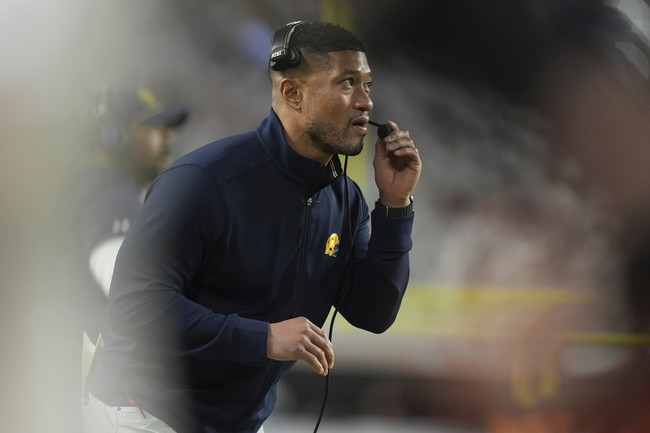We support our Publishers and Content Creators. You can view this story on their website by CLICKING HERE.

On Thursday night, Notre Dame eked out a 27-24 win over Penn State in the Orange Bowl, setting the Fighting Irish up to attempt to claim their first national title since 1988. The team was led by its head coach, Marcus Freeman, who has become quite a superstar in the college football world lately. He’s a class act and comes across as a pretty decent human in general, something even his opponents recognize (heck, he’s the reason my Georgia Bulldogs aren’t in the playoffs), and he’s obviously a great coach. The entire nation has celebrated Freeman for both of these accomplishments.
Advertisement
Well, the entire nation except ESPN. All the sports network seems to see is his race.
Ever since it was determined that Freeman or Penn State head coach James Franklin would be one of the two coaches in the championship game, ESPN has been beside itself, breathlessly reporting about this idea of “making history.” For the first time, a black man would coach a team in the College Football Playoff National Championship.
History loading 🙌 pic.twitter.com/wNzkKXc7S3
— ESPN (@espn) January 3, 2025
Fair enough. As I reported last month, it is historically significant, but it shouldn’t overshadow the accomplishments this man has achieved as an individual. But ESPN just won’t give it up. As soon as Notre Dame got the win last night, the network’s sideline reporter Molly McGrath interviewed Freeman and led with this question: “…you are the first black head coach to go to a national championship game in college football… how much does this mean to you?”
Freeman, who has already addressed this topic and seemed to think it was important but not as important as the sports media wants to make it, took some time to respond before saying, “I’ve said this before — I don’t ever want to take attention away from the team. It is an honor, and I hope all coaches, minorities, black, Asian, white — it doesn’t matter — great people continue to get opportunities to lead young men like this. But this ain’t about me. This is about us. And we’re gonna celebrate what we’ve done because it’s something special.”
Advertisement
Notre Dame just won its biggest game since 1988. How does @espn react? By focusing on one half of Marcus Freeman’s race. Freeman absolutely crushes his answer and says he hopes all coaches regardless of race get great opportunities like he did. pic.twitter.com/GL3DL6lzB6
— Clay Travis (@ClayTravis) January 10, 2025
As you can imagine, this exchange received plenty of feedback from X users, most of them cheering on Freeman and ticked at ESPN for taking this man’s accomplishments and making them about his race.
Related: Notre Dame Football Coach: ‘Your Color Shouldn’t Matter’
One notable exception was former NFL tight end — and fellow UGA alum — Benjamin Watson. Watson is typically pretty smart and fair-minded, and he is a huge champion for life, which I respect, but he defended McGrath’s questioning by saying, among other things, “It’s unfortunate that Coach Freeman has to answer this question but that’s not ESPN’s fault. It’s because this is America. Every aspect of our culture has a racial history, much of it violent. It does no one justice, past or present, to ignore both the breakthroughs and the brokenness.” (It should also be noted that Watson is an ESPN/SEC Network employee.)
We live in America. The construct of race has been one of the most defining characteristics of our republic. It’s unfortunate that Coach Freeman has to answer this question but that’s not ESPN’s fault. It’s because this is America. Every aspect of our culture has a racial… https://t.co/5wYPm4nKdn
— Benjamin Watson (@BenjaminSWatson) January 10, 2025
Advertisement
Pastor and theologian Darrell B. Harrison responded to Watson and pointed out that he was “reproblematizing historical grievances to support a contemporary narrative,” citing an example of an illustration once used by Booker T. Washington.
Respectfully, Mr. Watson, the apologetic you’re proffering, which seems intent on reproblematizing historical grievances to support a contemporary narrative (e.g. “This is America”), is, ironically, and in my humble opinion, precisely why media outlets like ESPN feel compelled to…
— Darrell B. Harrison (@D_B_Harrison) January 10, 2025
In response to another X user, Harrison also wished that “Mr. Watson would adopt that same attitude with regard to past ethnic injustices committed against black people in this country. That is not America anymore and it is wrong for him to speak as if it is. His own success is a living testimony to that fact.”
On February 12, 1865, former slave and pastor of the Fifteenth Street Presbyterian Church in Washington, D.C., Rev. Henry Highland Garnett, gave a speech before Congress titled, Let the Monster Perish, in which he said: “Let slavery die. It has had a long and fair trial. God…
— Darrell B. Harrison (@D_B_Harrison) January 10, 2025
He makes a good point. Both Freeman and Watson have been incredibly successful both on and off the football field. And I maintain that this is because they are both gifted individuals. Their race may or may not have helped shape their identity, but if it has anything to do with their success, it’s only a small fraction. That’s for them to decide, not me or ESPN.
Advertisement
Focusing so heavily on it is an insult to the hard work and effort they’ve put into their careers over the years. It’s beyond time that we start seeing every unique person for who they are rather than what group they belong to.

 Conservative
Conservative  Search
Search Trending
Trending Current News
Current News 







